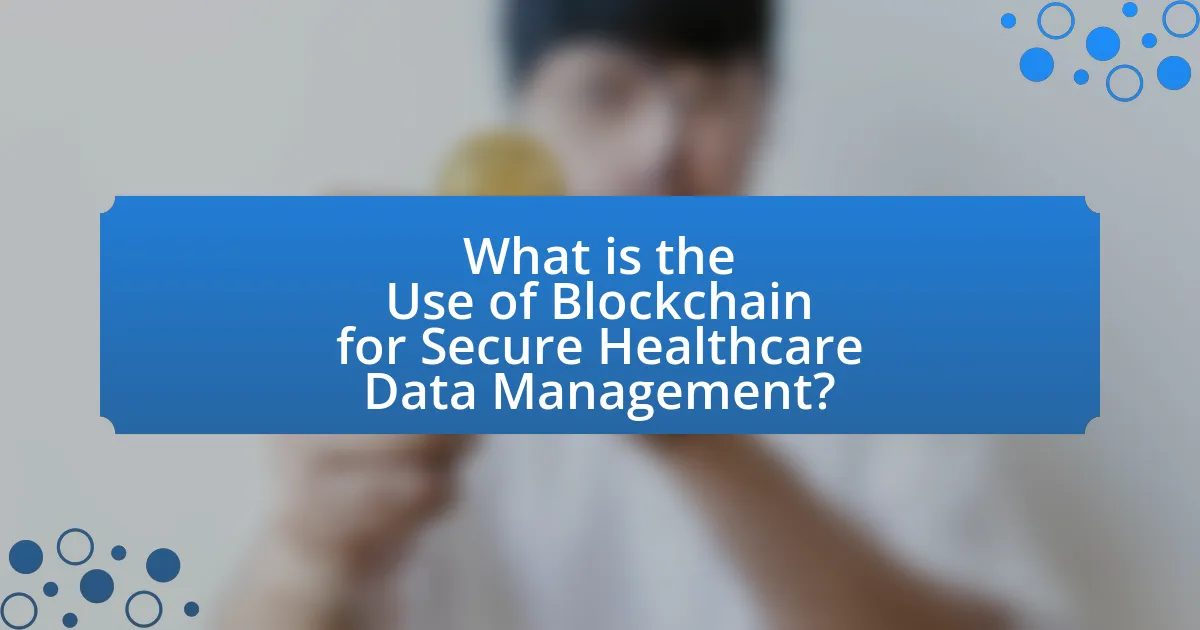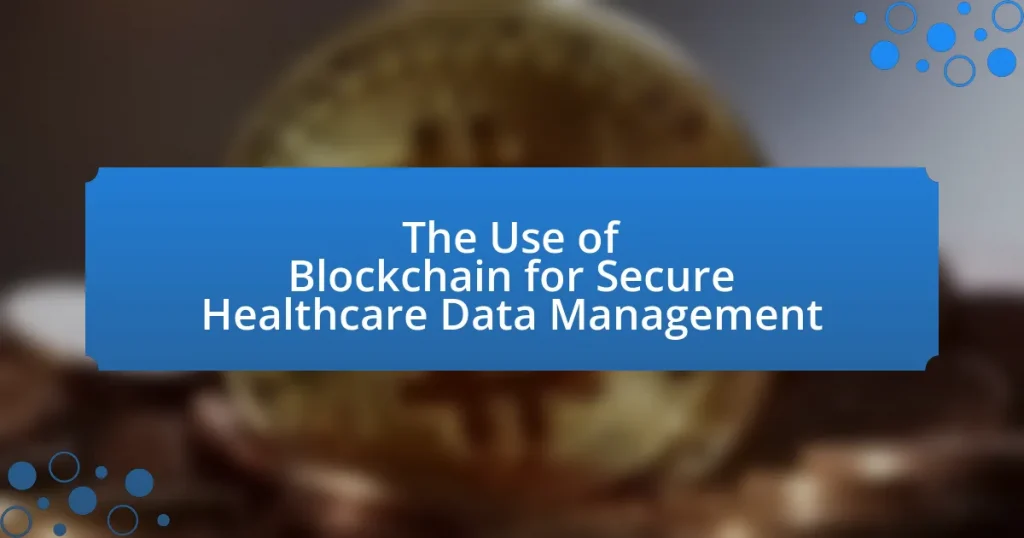Blockchain technology is increasingly recognized for its potential to enhance secure healthcare data management through a decentralized and immutable ledger system. This article explores how blockchain improves data integrity and security, addressing critical issues such as unauthorized access, data breaches, and patient privacy. Key features of blockchain, including decentralization, immutability, and cryptographic security, are examined in relation to their impact on healthcare data management challenges. Additionally, the article discusses the importance of secure data management in healthcare, the risks associated with insecure practices, and the potential benefits of implementing blockchain solutions, including improved interoperability and cost savings for healthcare organizations.

What is the Use of Blockchain for Secure Healthcare Data Management?
Blockchain is used for secure healthcare data management by providing a decentralized and immutable ledger that enhances data integrity and security. This technology allows healthcare providers to store patient records in a way that prevents unauthorized access and ensures that data cannot be altered without consensus from all parties involved. For instance, a study published in the Journal of Medical Internet Research highlights that blockchain can improve patient data sharing while maintaining privacy and security, as it allows for encrypted data transactions that are transparent and traceable. This capability significantly reduces the risk of data breaches and enhances trust among stakeholders in the healthcare system.
How does blockchain technology enhance data security in healthcare?
Blockchain technology enhances data security in healthcare by providing a decentralized and immutable ledger for storing patient information. This decentralization ensures that no single entity has control over the data, reducing the risk of unauthorized access and data breaches. The immutability feature means that once data is recorded on the blockchain, it cannot be altered or deleted without consensus from the network, which protects against tampering and fraud. Additionally, blockchain employs cryptographic techniques to secure data, ensuring that only authorized users can access sensitive information. According to a study published in the Journal of Medical Internet Research, blockchain can significantly improve data integrity and patient privacy, demonstrating its effectiveness in enhancing security in healthcare data management.
What are the key features of blockchain that contribute to data security?
The key features of blockchain that contribute to data security include decentralization, immutability, and cryptographic security. Decentralization ensures that data is distributed across multiple nodes, reducing the risk of a single point of failure or attack. Immutability means that once data is recorded on the blockchain, it cannot be altered or deleted, which protects against unauthorized changes and fraud. Cryptographic security employs advanced encryption techniques to secure data, ensuring that only authorized users can access or modify it. These features collectively enhance the integrity and confidentiality of healthcare data, making blockchain a robust solution for secure data management.
How does decentralization in blockchain improve data integrity?
Decentralization in blockchain enhances data integrity by distributing data across multiple nodes, which reduces the risk of data tampering. Each node maintains a copy of the entire blockchain, ensuring that any attempt to alter data would require consensus from the majority of nodes, making unauthorized changes highly unlikely. This mechanism is supported by cryptographic hashing, where each block is linked to the previous one, creating a secure chain that is resistant to alterations. For instance, the Bitcoin blockchain, which operates on a decentralized network, has demonstrated resilience against data manipulation since its inception in 2009, with no successful breaches reported that altered transaction data.
Why is secure data management critical in healthcare?
Secure data management is critical in healthcare to protect sensitive patient information and ensure compliance with regulations such as HIPAA. The healthcare sector handles vast amounts of personal data, making it a prime target for cyberattacks; in 2021 alone, healthcare data breaches affected over 45 million individuals in the United States. Effective data management practices safeguard against unauthorized access, maintain data integrity, and enhance patient trust, which is essential for effective healthcare delivery.
What are the risks associated with insecure healthcare data management?
Insecure healthcare data management poses significant risks, including data breaches, identity theft, and compromised patient safety. Data breaches can lead to unauthorized access to sensitive patient information, resulting in financial loss and reputational damage for healthcare organizations. According to the U.S. Department of Health and Human Services, over 45 million healthcare records were breached in 2020 alone, highlighting the scale of the issue. Identity theft can occur when personal health information is exploited, leading to fraudulent medical claims and financial fraud. Additionally, compromised patient safety can arise from inaccurate or tampered medical records, which can adversely affect treatment decisions and patient outcomes. These risks underscore the critical need for secure data management practices in healthcare.
How do data breaches impact patient trust and healthcare organizations?
Data breaches significantly undermine patient trust and adversely affect healthcare organizations. When sensitive patient information is compromised, patients often feel vulnerable and question the security measures of their healthcare providers. A study by the Ponemon Institute found that 60% of patients would consider switching providers after a data breach, indicating a direct correlation between breaches and loss of patient loyalty. Furthermore, healthcare organizations face financial repercussions, including costs related to breach response, regulatory fines, and potential lawsuits, which can exceed millions of dollars. This financial strain can hinder their ability to invest in improved security measures, perpetuating a cycle of vulnerability and distrust.
What are the current challenges in healthcare data management?
Current challenges in healthcare data management include data interoperability, data security, and regulatory compliance. Data interoperability is hindered by the lack of standardized formats, making it difficult for different systems to communicate effectively. According to a 2020 report by the Office of the National Coordinator for Health Information Technology, only 30% of healthcare providers can easily share patient data across different systems. Data security remains a significant concern, with healthcare organizations facing increasing cyber threats; the 2021 IBM Cost of a Data Breach Report indicated that the healthcare sector has the highest average cost per data breach at $9.23 million. Additionally, regulatory compliance with laws such as HIPAA adds complexity, as organizations must navigate strict guidelines to protect patient information while managing data efficiently.
How do interoperability issues affect data sharing in healthcare?
Interoperability issues significantly hinder data sharing in healthcare by creating barriers between different systems and platforms. These barriers prevent seamless communication and data exchange, leading to fragmented patient information and inefficiencies in care delivery. For instance, a study by the Office of the National Coordinator for Health Information Technology found that 56% of healthcare providers reported difficulties in sharing patient data due to incompatible systems. This lack of interoperability can result in delays in treatment, increased costs, and compromised patient safety, as healthcare professionals may not have access to complete and accurate patient histories.
What role do regulations play in healthcare data management challenges?
Regulations play a critical role in shaping healthcare data management challenges by establishing compliance requirements that organizations must follow. These regulations, such as the Health Insurance Portability and Accountability Act (HIPAA) in the United States, dictate how patient data should be stored, accessed, and shared, creating a framework that organizations must navigate to avoid legal penalties. Compliance with these regulations often leads to increased operational costs and complexity in data management systems, as organizations must implement robust security measures and maintain detailed records to demonstrate adherence. For instance, a 2021 report by the Office of the National Coordinator for Health Information Technology highlighted that 70% of healthcare organizations faced significant challenges in meeting regulatory requirements, which directly impacts their ability to manage data effectively.
How can blockchain address these challenges in healthcare data management?
Blockchain can address challenges in healthcare data management by providing a secure, decentralized, and immutable ledger for storing patient information. This technology enhances data integrity and security, reducing the risk of data breaches and unauthorized access, which are significant concerns in healthcare. For instance, a study published in the Journal of Medical Internet Research highlights that blockchain can ensure data authenticity and traceability, allowing healthcare providers to verify the source and accuracy of patient records. Additionally, blockchain facilitates interoperability among different healthcare systems, enabling seamless data sharing while maintaining patient privacy. This capability is crucial for improving care coordination and reducing administrative burdens in healthcare settings.
What are the potential benefits of implementing blockchain in healthcare?
Implementing blockchain in healthcare can enhance data security, improve interoperability, and streamline administrative processes. Blockchain technology provides a decentralized and immutable ledger, which ensures that patient data is securely stored and accessed only by authorized parties, reducing the risk of data breaches. According to a study published in the Journal of Medical Internet Research, blockchain can facilitate secure sharing of electronic health records (EHRs) among healthcare providers, leading to better patient outcomes and reduced duplication of tests. Additionally, the transparency and traceability of blockchain can help in tracking the supply chain of pharmaceuticals, thereby combating counterfeit drugs and ensuring patient safety.
How does blockchain improve patient data accessibility and control?
Blockchain enhances patient data accessibility and control by providing a decentralized and secure framework for storing and sharing health information. This technology allows patients to have ownership of their data, enabling them to grant or revoke access to healthcare providers as needed. For instance, a study published in the Journal of Medical Internet Research highlights that blockchain can facilitate interoperability among different healthcare systems, ensuring that patients can access their medical records seamlessly across various platforms. Additionally, the immutable nature of blockchain records ensures that any changes to patient data are transparent and traceable, further empowering patients to manage their health information effectively.
What cost savings can healthcare organizations expect from blockchain adoption?
Healthcare organizations can expect significant cost savings from blockchain adoption, primarily through reduced administrative expenses and enhanced operational efficiencies. By streamlining processes such as patient data management, billing, and claims processing, blockchain can minimize the need for intermediaries and reduce errors, which often lead to costly delays and disputes. For instance, a study by the IBM Institute for Business Value found that blockchain could potentially save the healthcare industry up to $100 billion annually by improving data sharing and reducing fraud. Additionally, the transparency and security of blockchain technology can lead to lower compliance costs and improved patient outcomes, further contributing to overall savings.
What are the real-world applications of blockchain in healthcare?
Blockchain has several real-world applications in healthcare, primarily focused on enhancing data security, interoperability, and patient privacy. One significant application is the secure storage and sharing of electronic health records (EHRs), which allows healthcare providers to access patient data seamlessly while maintaining data integrity and confidentiality. For instance, a study published in the Journal of Medical Internet Research highlighted that blockchain can reduce data breaches by providing a decentralized and tamper-proof system for managing health records.
Another application is in supply chain management for pharmaceuticals, where blockchain technology ensures the authenticity and traceability of drugs, thereby combating counterfeit medications. The World Health Organization reported that counterfeit drugs account for up to 10% of the global medicine market, and blockchain can help mitigate this issue by providing a transparent ledger of drug transactions.
Additionally, blockchain facilitates clinical trials by enabling secure and transparent data sharing among researchers, which can enhance collaboration and trust in the results. A report from the National Institutes of Health indicated that using blockchain in clinical trials could streamline processes and improve data accuracy.
These applications demonstrate how blockchain technology can transform healthcare by improving data management, enhancing security, and fostering trust among stakeholders.
How is blockchain being used for electronic health records (EHRs)?
Blockchain is being used for electronic health records (EHRs) to enhance data security, interoperability, and patient control over their health information. By utilizing a decentralized ledger, blockchain ensures that EHRs are immutable and tamper-proof, which significantly reduces the risk of data breaches and unauthorized access. For instance, a study published in the Journal of Medical Internet Research in 2020 demonstrated that blockchain can facilitate secure sharing of health data among providers while maintaining patient privacy. Additionally, blockchain enables patients to have greater control over their own health records, allowing them to grant or revoke access to their data as needed, thereby promoting patient engagement and trust in the healthcare system.
What role does blockchain play in drug supply chain management?
Blockchain plays a crucial role in drug supply chain management by enhancing transparency, traceability, and security. It enables all participants in the supply chain, including manufacturers, distributors, and pharmacies, to access a shared, immutable ledger that records every transaction involving a drug. This transparency helps in verifying the authenticity of drugs, reducing the risk of counterfeit products, which is a significant issue in the pharmaceutical industry. According to a report by the World Health Organization, counterfeit medicines account for up to 10% of the global medicine market, highlighting the need for robust tracking systems. By utilizing blockchain technology, stakeholders can trace the origin and journey of drugs in real-time, ensuring compliance with regulations and improving overall safety for patients.
What are the future trends for blockchain in healthcare data management?
Future trends for blockchain in healthcare data management include enhanced interoperability, improved patient consent management, and increased data security. Interoperability will allow different healthcare systems to share data seamlessly, facilitating better patient care and outcomes. Improved patient consent management will empower individuals to control who accesses their health data, aligning with privacy regulations like GDPR. Increased data security will stem from blockchain’s decentralized nature, reducing the risk of data breaches; a study by the World Economic Forum indicates that blockchain can reduce healthcare fraud by up to 50%. These trends reflect a shift towards more secure, efficient, and patient-centered healthcare systems.
How might advancements in blockchain technology shape healthcare data security?
Advancements in blockchain technology can significantly enhance healthcare data security by providing decentralized, immutable, and transparent data management solutions. Blockchain’s decentralized nature reduces the risk of data breaches, as there is no single point of failure; instead, data is distributed across a network of nodes. The immutability feature ensures that once data is recorded, it cannot be altered or deleted without consensus from the network, which protects against unauthorized modifications. Additionally, blockchain’s transparency allows for real-time auditing and tracking of data access, which can help identify and mitigate potential security threats. According to a study published in the Journal of Medical Internet Research, blockchain can improve patient data integrity and confidentiality, thereby fostering trust among stakeholders in the healthcare ecosystem.
What are the anticipated regulatory changes regarding blockchain in healthcare?
Anticipated regulatory changes regarding blockchain in healthcare include the establishment of clearer guidelines for data privacy, interoperability standards, and security protocols. These changes are expected to address concerns over patient consent, data ownership, and the use of blockchain for secure data sharing among healthcare providers. For instance, the U.S. Department of Health and Human Services has indicated a focus on aligning blockchain technology with the Health Insurance Portability and Accountability Act (HIPAA) to ensure compliance with privacy regulations. Additionally, the European Union’s General Data Protection Regulation (GDPR) is likely to influence how blockchain solutions are designed to protect personal health information.
What best practices should healthcare organizations follow when implementing blockchain?
Healthcare organizations should prioritize interoperability, data security, and regulatory compliance when implementing blockchain. Interoperability ensures that blockchain systems can communicate with existing healthcare IT systems, facilitating seamless data exchange. Data security is critical; organizations must employ encryption and access controls to protect sensitive patient information stored on the blockchain. Regulatory compliance involves adhering to healthcare regulations such as HIPAA in the United States, which mandates the protection of patient data. By focusing on these best practices, healthcare organizations can effectively leverage blockchain technology to enhance data management and patient care.


